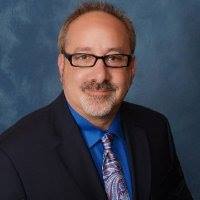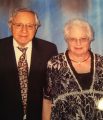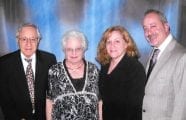For Descendant Submission, Select "Interview "Above by Brian Cige
BRIAN CIGE INTERVIEW
Date: May 3, 2017
Location: Brian Cige Law Office
Interviewer: Nancy Gorrell
Q: Describe your grandparent’s background.
Both my grandparents, Joseph and Sarah Cige were from a village called Kalesh in Poland. When my grandfather was a young man and he was going to be drafted into the Polish army, he fled to Germany. By the law at the time, he therefore lost his Polish citizenship. He then went back to Poland and found my grandmother, and he and my grandmother settled in Berlin where he became a successful tailor.
Q: Did he become a German citizen?
Good question. No. The law in Germany was that you were the citizen where your father was a citizen. This was in pre-Hitler time. So my grandfather was “citizenshipless.” Even though my father was born in Berlin, he didn’t have German citizenship either. They had citizenship for the first time when they became naturalized in America.
Q: Did you grandparents or father relate any stories to you about Berlin in the pre-Hitler times?
At age of 16, my grandfather had a very successful sewing factory, and he had Germans working for him, and eventually the employees complained about him because he was Jewish.
Q: Did your father speak about growing up in Berlin?
Eventually, but not when I was growing up. Only when I was pushing him and taking him to 2nd generation conferences, did he begin to talk about it.
Q: Did your father witness Kristallnacht?
My father went to work at the tailor factory and wrote on the blackboard “No talking,” and the employees complained and the Nazi’s came. Eventually, he had to walk away and abandon his business and his house. My grandfather, my father and Bert, his brother, all went ahead to find safety, and then sent they sent a signal to the rest of the family to come to France.
Q: Where did they go in France?
They started in northern France and then went to southern France. After a year, the Vichy government collaborators rounded them up. They were gathered and separated by men and women and children and sent to an internment camp. By the time my father got to the camp, he was ten years old. He was with his father and his younger brother, Bert (Sigmund was his name in Germany)
Q: What do you know about their camp experience?
While my father and brother were in Agde, there was a French Christian charitable group that offered to buy sick children, and they worked in conjunction with HIAS. They said to my grandparents, “Is it ok to do this?” and my grandmother said, “Yes.” But it must have been a tough day for her not knowing if she would ever see her children again.
Q: How did your father and his brother leave Agde internment camp?
The charity arranged for my father to leave the camp and his parents behind. Eventually, they brought the Jewish kids to a church in France, and then they made their way to Spain, and then they were put on a boat to America. They entered America through Ellis Island. This was sometime in 1941.
Q: What do you know about your father and his brother’s Ellis Island experience?
There was a charity that met them at Ellis Island and then took them to foster families in St. Louis. He was in the Ellis Island hospital for a week. And his brother went ahead without him. They were separated and my father as a young boy was completely alone. Their names were changed for them in Ellis Island too—to Americanize them—so Sigmund became Bert and Manfred became Fred.
Q: Did father talk to you about this experience?
Not a lot. He did not want to relive it. He did not wanting to put that information in his children’s heads.
Q: Who were his foster parents?
My father and uncle Bert bounced around from foster home to foster home from the time they were about 12 years old until they were 21. And then Grandma and Grandpa arrived in Brooklyn and then they had to leave St. Louis and go to a new place—New York City to live in a small cramped apartment with siblings they didn’t know—the twins born in the camp. It had been more than a decade since he had seen his younger sisters.
Q: What happened to the siblings left behind?
My grandmother was in Rivesaltes transit camp. She heard if you were pregnant, they wouldn’t deport you. So she got pregnant. The twins were born in Rivesaltes after my father left, so he had never met them. Twin girls. His younger sister was in the first camp; she was probably about four or five years younger than him. They all kept moving from camp to camp in those years, and they were completing the tracks to Germany when the war ended.
Q: Did your grandparents have trouble getting to America? What happened to your remaining family?
My grandparents came to the United States in 1950. I think they stayed in France waiting to get to the US where they could reunite with my father and uncle.
Q: How did your father meet your mother?
I think that they were on vacation in Canada somewhere. She was from Boston. I think it was 1955. They married when he was 26 years old. I was born in 1959. The family was living in Brooklyn.
Q: How long did your family reside in Brooklyn?
Until 1971, when the whole family moved to Somerset, New Jersey, Franklin Township where my father still lives today (2017). My grandparents passed around 1986 or 1987.
Lorem ipsum dolor sit amet, consectetur adipiscing elit. Fusce condimentum lacus purus, et suscipit justo semper nec. Maecenas non lectus odio. Aliquam volutpat neque ac placerat gravida. Nullam sit amet venenatis ante. Proin vestibulum volutpat purus vel dapibus.





